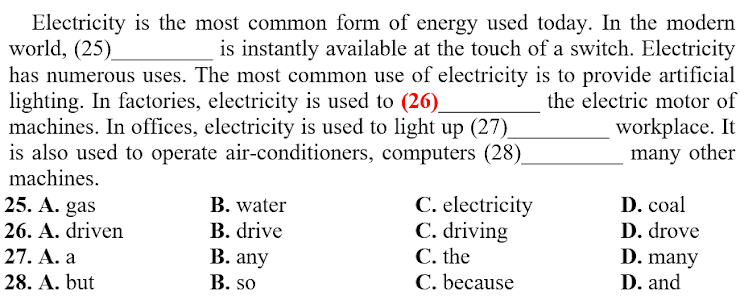Read the following passage and mark the letter A, B, C, or D on your answer sheet to indicate the correct word or phrase that best fits each of the numbered blanks from 31 to 35.
If you ask anyone who invented television, they will tell you that it was John Logie Baird. While Baird was, of course, extremely important in the history of television, it would be more accurate to see his role as part of a (31) _____ of events which finally led to television as we know it today.
The history of television really begins in 1817 with the discovery by Berzelius, a Swedish chemist, of the chemical selenium. It was found that the amount of electric current that selenium could carry depended on how much light struck it.
This discovery directly led to G. R. Carey, an American inventor, (32) _____ up with the first real television system in 1875. His system used selenium to transmit a picture along wires to a row of light bulbs. This picture was not very clear, however.
Over the next few years, a number of scientists and inventors simplified and improved on Carey's system. It was not until1923 that Baird made the first practical transmission. Once again, the picture was (33) _____ through wires, but it was much clearer than Carey's had been almost fifty years before.
The Second World War (34) _____the development of television. After the war, television sets began to flood the market, with the first mass TV audience watching the baseball World Series in the USA in 1947. Within a few years, television had captured the (35) _____ of the whole world.
Điền ô số 32
A. coming
B. making
C. going
D. doing


Đáp án A
Giải thích: Cụm động từ
Come up with = nghĩ ra, phát minh ra giải pháp cho một vấn đề
Dịch nghĩa: This discovery directly led to G. R. Carey, an American inventor, coming up with the first real television system in 1875 = Phát hiện này trực tiếp dẫn đến việc G. R. Carey, một nhà phát minh người Mỹ, phát minh ra các hệ thống truyền hình thực tế đầu tiên vào năm 1875.
B. make up with sb = hòa giải với ai
C. go up = được xây dựng lên / mở cánh gà / bị phá hủy bởi lửa hoặc vụ nổ / tăng giá
D. do up = gói ghém / trang trí lại nhà cửa / đóng cúc, buộc lại áo khoác, váy, …